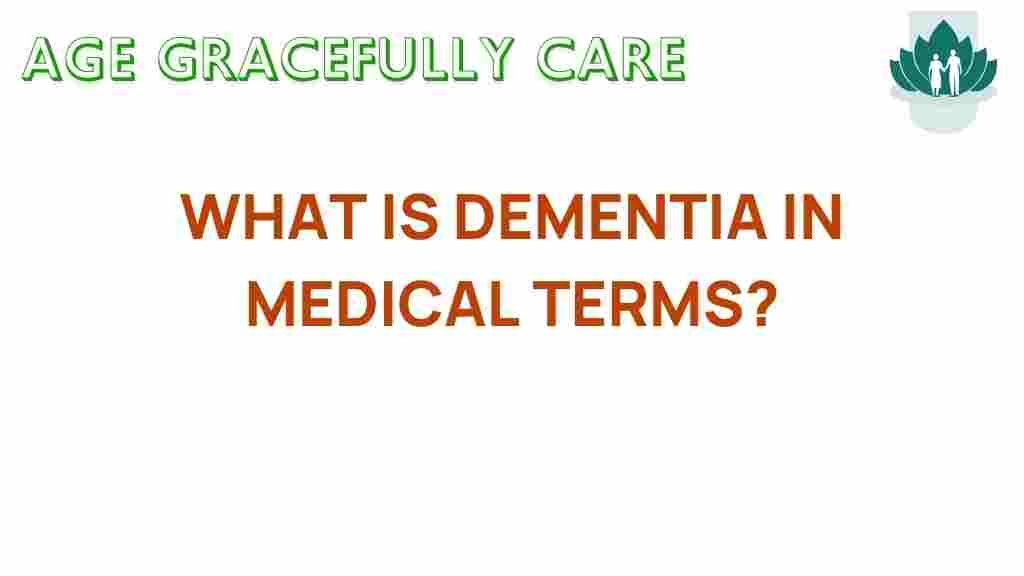Dementia: Medical Definition and Understanding Its Impact
Dementia is a term that encompasses a range of symptoms associated with a decline in cognitive function severe enough to interfere with daily life. This neurological disorder is not a specific disease but rather a collection of symptoms that can result from various underlying conditions. The medical definition of dementia often emphasizes the progressive nature of cognitive decline, which can affect memory, thinking, and social abilities. Understanding dementia is crucial not only for those directly affected but also for caregivers, families, and society at large.
What is Dementia?
Dementia is characterized by a decline in cognitive function that affects an individual’s ability to perform everyday activities. It is important to note that dementia is an umbrella term that includes various types of cognitive disorders. Below are some key points about dementia:
- Neurological Disorder: Dementia is classified as a neurological disorder, indicating that it originates from changes in the brain’s structure and function.
- Progressive Nature: The symptoms of dementia typically worsen over time, making early diagnosis and intervention essential.
- Multiple Causes: Various conditions can cause dementia, including Alzheimer’s disease, vascular dementia, Lewy body dementia, and frontotemporal dementia.
Common Symptoms of Dementia
The symptoms of dementia can vary significantly among individuals depending on the type and stage of the disorder. However, some common symptoms include:
- Memory Loss: Difficulty remembering recent events, conversations, or appointments.
- Confusion: Disorientation regarding time or place, leading to getting lost in familiar surroundings.
- Difficulty with Language: Trouble finding the right words or following conversations.
- Impaired Judgment: Poor decision-making skills and difficulty managing finances.
- Changes in Mood and Personality: Increased anxiety, depression, or mood swings.
Diagnosis of Dementia
Diagnosing dementia involves a comprehensive evaluation, which typically includes the following steps:
- Medical History: A thorough medical history is taken, including a review of symptoms and any family history of cognitive disorders.
- Physical Examination: A physical exam helps rule out other medical conditions that could be causing cognitive decline.
- Cognitive Tests: Standardized tests are administered to assess memory, problem-solving abilities, and other cognitive skills.
- Neuroimaging: Imaging techniques such as MRI or CT scans may be used to identify structural changes in the brain.
For more detailed insights into the diagnostic process, you can explore resources available at the National Institute on Aging.
Treatment Options for Dementia
While there is currently no cure for dementia, various treatment options can help manage symptoms and improve quality of life. These may include:
- Medications: Certain medications can help manage symptoms, such as cholinesterase inhibitors for Alzheimer’s disease.
- Therapy: Cognitive behavioral therapy (CBT) and other therapeutic approaches can help individuals cope with the emotional aspects of dementia.
- Lifestyle Changes: Engaging in regular physical activity, maintaining a healthy diet, and staying socially active can contribute positively to cognitive health.
Care Strategies for Patients with Dementia
Caring for someone with dementia presents unique challenges. Here are some effective care strategies:
- Establish Routines: Predictable routines can provide comfort and stability for individuals with dementia.
- Communication Techniques: Use simple language, speak slowly, and maintain eye contact to facilitate communication.
- Safety Measures: Implement safety measures at home, such as removing tripping hazards and using locks on doors if wandering is a concern.
- Engagement: Encourage participation in engaging activities that promote cognitive function, such as puzzles and memory games.
Patient Support and Resources
Support for dementia patients and their families is crucial. Here are some resources that can provide assistance:
- Support Groups: Joining support groups can help families connect with others facing similar challenges.
- Online Resources: Websites like Alzheimer’s Association offer a wealth of information on dementia care and support.
- Professional Caregivers: Hiring trained caregivers can provide respite and ensure that patients receive the best care.
Step-by-Step Process for Managing Dementia Care
Managing dementia care can be overwhelming. Here’s a step-by-step process to make it more manageable:
- Educate Yourself: Learn as much as possible about dementia, its symptoms, and progression.
- Communicate with Healthcare Providers: Maintain open communication with doctors and specialists to develop a tailored care plan.
- Involve Family and Friends: Engage family members and friends in the care process to create a support network.
- Monitor Changes: Keep track of changes in the patient’s condition and adjust care strategies accordingly.
- Prioritize Self-Care: Caregivers must also prioritize their well-being to provide effective support.
Troubleshooting Tips for Caregivers
Caregiving can present various challenges. Here are some troubleshooting tips:
- Behavioral Changes: If the patient exhibits sudden mood swings or aggression, remain calm and use soothing language to de-escalate the situation.
- Refusal of Care: If the patient refuses assistance, try to understand their feelings and provide choices to promote autonomy.
- Communication Barriers: If communication becomes challenging, utilize non-verbal cues and visual aids to enhance understanding.
Conclusion
Understanding dementia is essential for addressing its impact on individuals and families. By knowing the medical definition, recognizing symptoms, and exploring diagnosis and treatment options, caregivers and patients can navigate this challenging journey together. With effective care strategies and support systems in place, individuals with dementia can maintain their dignity and quality of life. As research continues to evolve, hope for better treatments and a deeper understanding of this complex neurological disorder remains on the horizon.
This article is in the category Health and created by AgeGracefullyCare Team
